7 start with W start with W
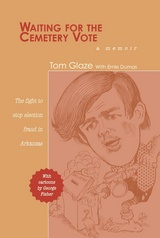
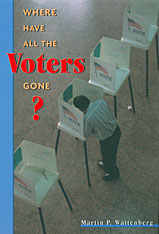
As the confusion over the ballots in Florida in 2000 demonstrated, American elections are complex and anything but user-friendly. This phenomenon is by no means new, but with the weakening of political parties in recent decades and the rise of candidate-centered politics, the high level of complexity has become ever more difficult for many citizens to navigate. Thus the combination of complex elections and the steady decline of the party system has led to a decline in voter turnout.
In this timely book, Martin Wattenberg confronts the question of what low participation rates mean for democracy. At the individual level, turnout decline has been highest among the types of people who most need to have electoral decisions simplified for them through a strong party system--those with the least education, political knowledge, and life experience.
As Wattenberg shows, rather than lamenting how many Americans fail to exercise their democratic rights, we should be impressed with how many arrive at the polls in spite of a political system that asks more of a typical person than is reasonable. Meanwhile, we must find ways to make the American electoral process more user-friendly.
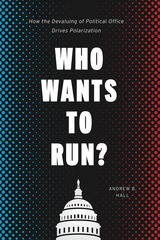
Andrew B. Hall argues that we have missed one of the most important reasons for this ideological gulf: the increasing reluctance of moderate citizens to run for office. While political scientists, journalists, and pundits have largely focused on voters, worried that they may be too partisan, too uninformed to vote for moderate candidates, or simply too extreme in their own political views, Hall argues that our political system discourages moderate candidates from seeking office in the first place. Running for office has rarely been harder than it is in America today, and the costs dissuade moderates more than extremists. Candidates have to wage ceaseless campaigns, dialing for dollars for most of their waking hours while enduring relentless news and social media coverage. When moderate candidates are unwilling to run, voters do not even have the opportunity to send them to office. To understand what is wrong with our legislatures, then, we need to ask ourselves the question: who wants to run? If we want more moderate legislators, we need to make them a better job offer.
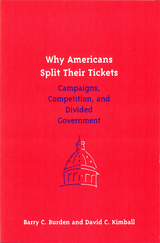
"Burden and Kimball have given us the most careful and thorough analysis of split-ticket voting yet. It won't settle all of the arguments about the origins of ticket splitting and divided government, but these arguments will now be much better informed. Why Americans Split Their Tickets is essential reading for anyone interested in understanding the major trends in U.S. electoral politics of the past several decades."
-Gary Jacobson, University of California, San Diego
"When voters split their tickets or produce divided government, it is common to attribute the outcome as a strategic verdict or a demand for partisan balance. Burden and Kimball strongly challenge such claims. With a thorough and deft use of statistics, they portray ticket-splitting as a by-product of the separate circumstances that drive the outcomes of the different electoral contests. This will be the book to be reckoned with on the matter of ticket splitting."
-Robert Erikson, Columbia University
"[Burden and Kimball] offset the expansive statistical analysis by delving into the historical circumstances and results of recent campaigns and elections. ... [They] make a scholarly and informative contribution to the understanding of the voting habits of the American electorate-and the resulting composition of American government."
-Shant Mesrobian, NationalJournal.com
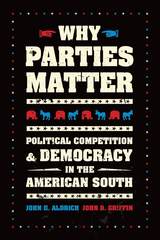
With Why Parties Matter, John H. Aldrich and John D. Griffin make a compelling case that competition between political parties is an essential component of a democracy that is responsive to its citizens and thus able to address their concerns. Tracing the history of the parties through four eras—the Democratic-Whig party era that preceded the Civil War; the post-Reconstruction period; the Jim Crow era, when competition between the parties virtually disappeared; and the modern era—Aldrich and Griffin show how and when competition emerged between the parties and the conditions under which it succeeded and failed. In the modern era, as party competition in the South has come to be widely regarded as matching that of the North, the authors conclude by exploring the question of whether the South is poised to become a one-party system once again with the Republican party now dominant.
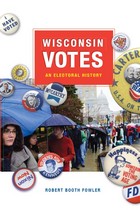
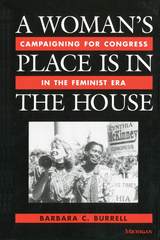
READERS
Browse our collection.
PUBLISHERS
See BiblioVault's publisher services.
STUDENT SERVICES
Files for college accessibility offices.
UChicago Accessibility Resources
home | accessibility | search | about | contact us
BiblioVault ® 2001 - 2024
The University of Chicago Press









